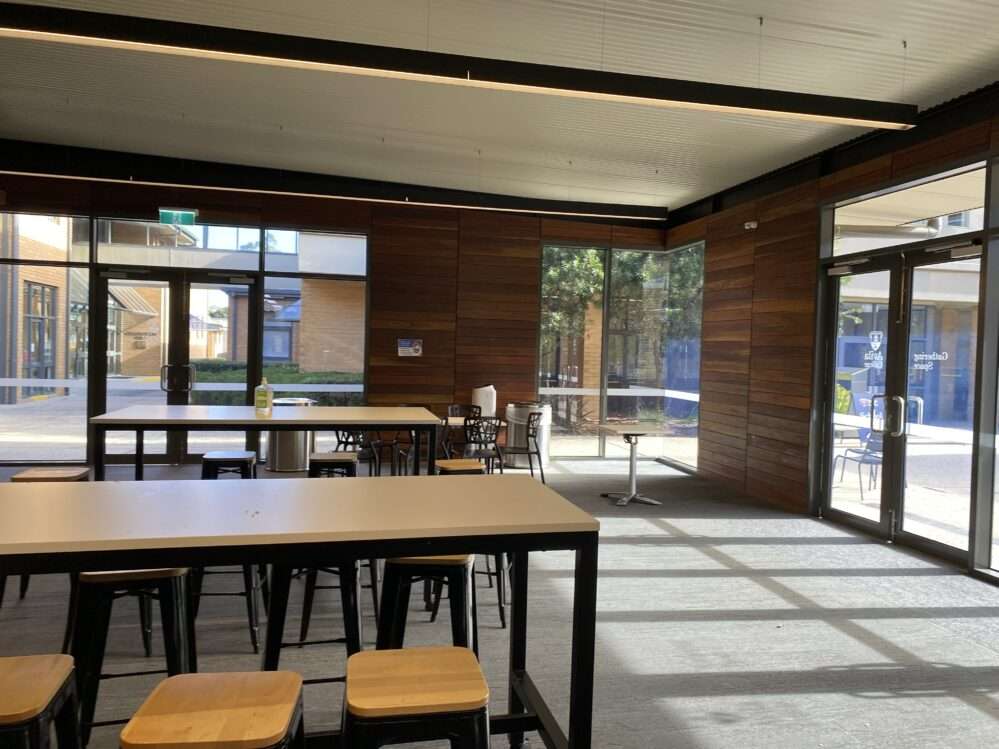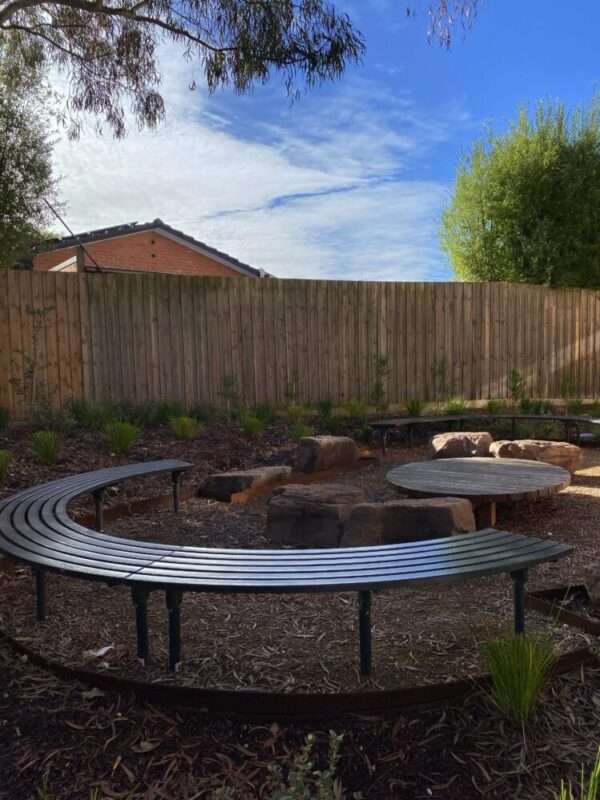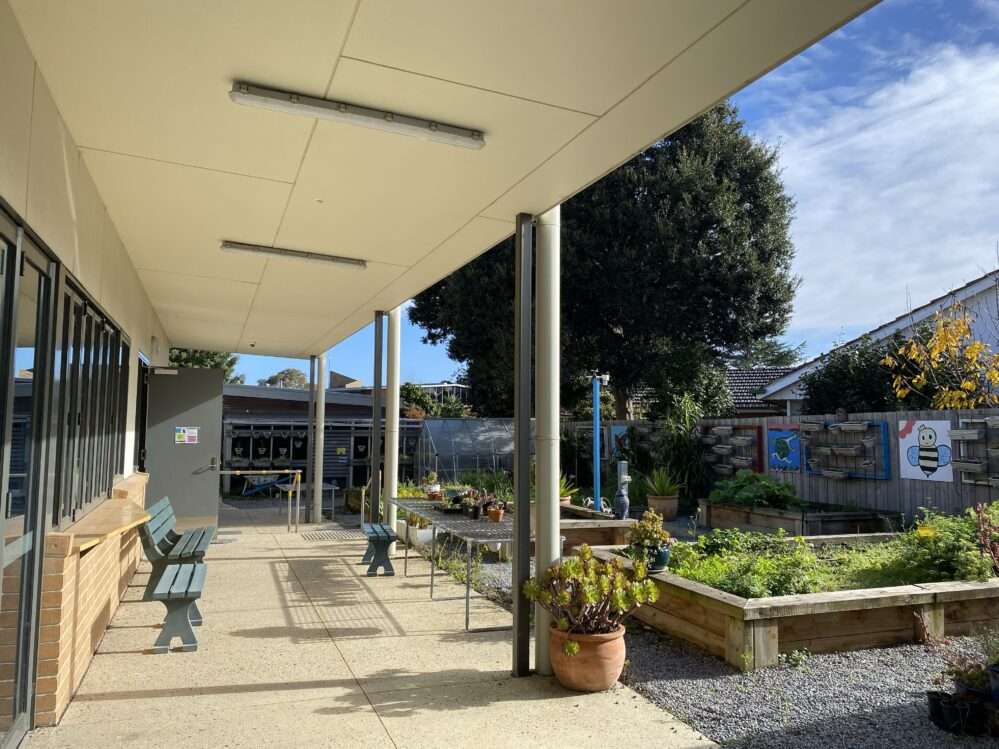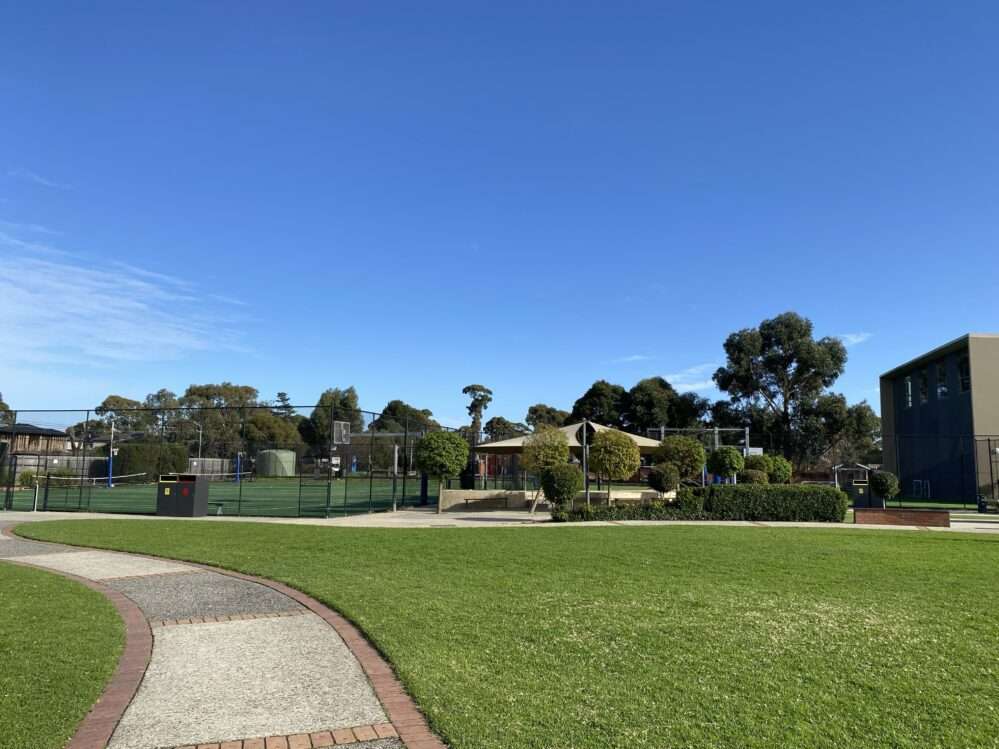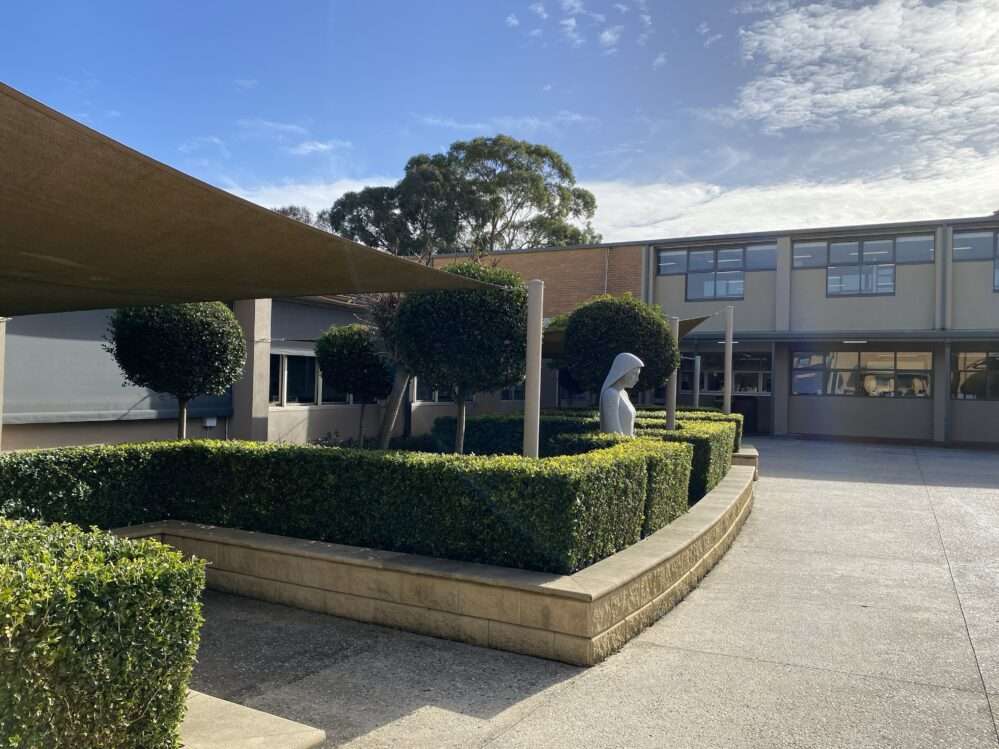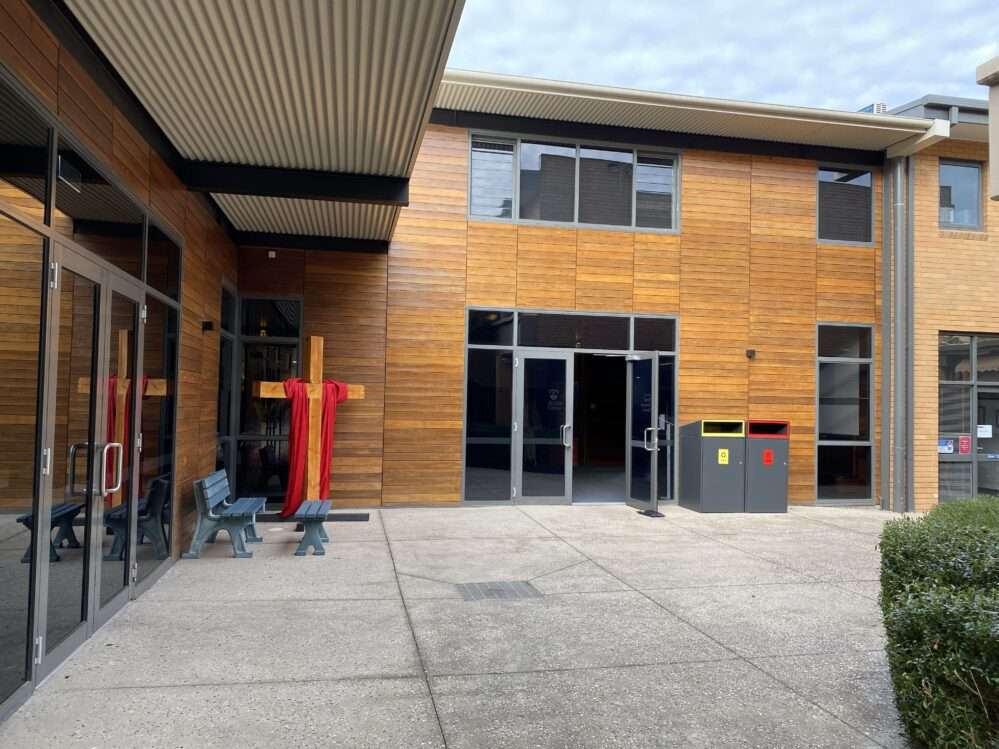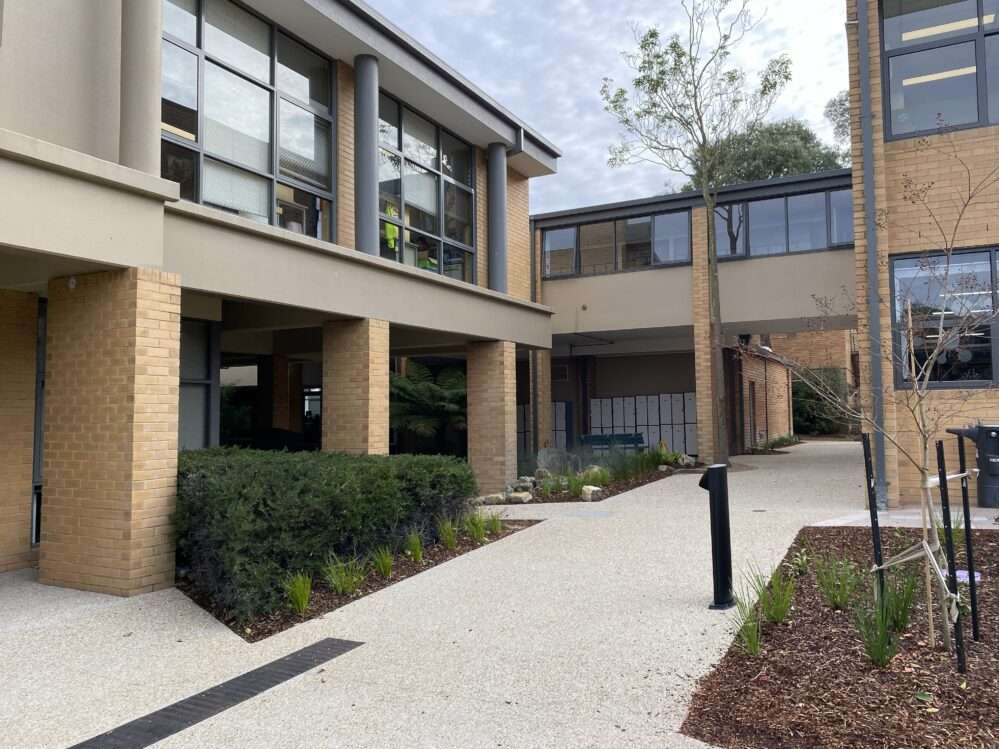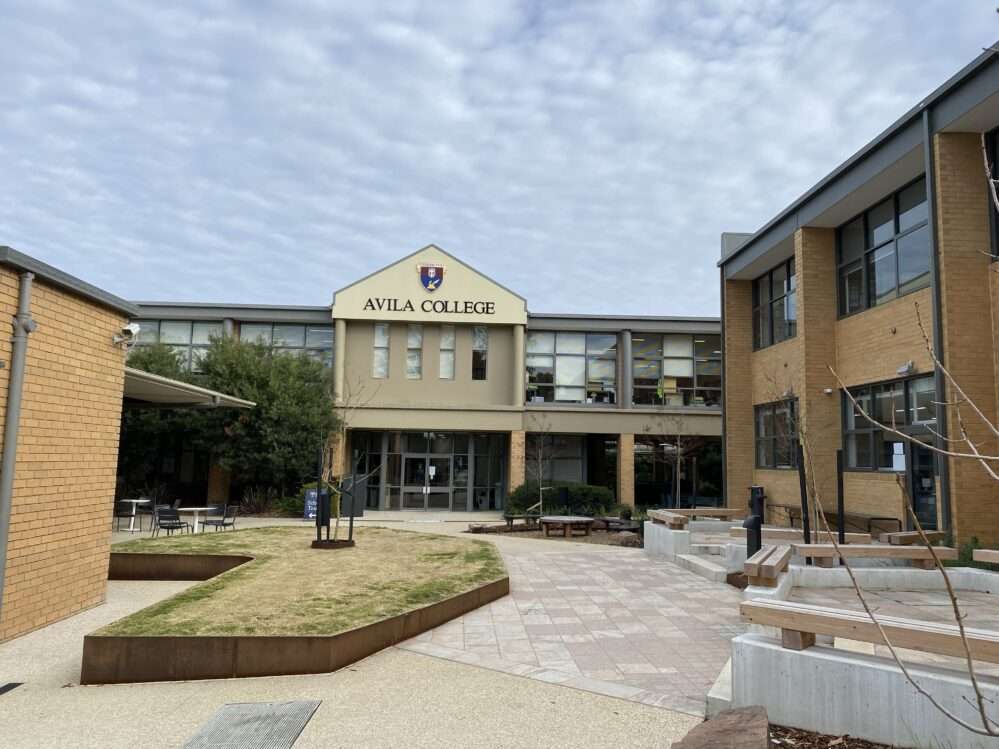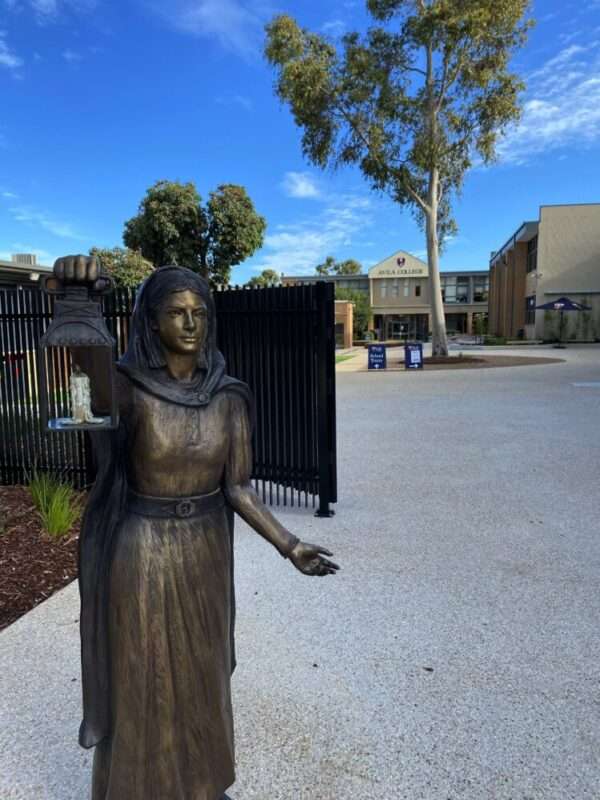I encourage you to personally tour the school and meet the educators and students, form your own opinion and leave a comment here.
Best of luck with your search for the perfect school!
Tour Details
Avila College principal’s address
The first thing that strikes me about Dr Michelle Cotter is how informal, approachable and chatty she is. She stands in front of the auditorium and chats cheerily to the audience as people arrive, which is something I haven’t seen any principal do.
Dr Cotter’s presentation presented Avila College’s academic results and other areas of focus through a slideshow.
During the presentation, she emphasised that academics are important, however it’s also very important to get involved with other aspects of the school to develop soft skills and character. There are plenty of extracurricular clubs, sports and creative arts that students can be a part of, and it is highly encouraged.
She spent time talking about the 2022 dux who not only achieved a terrific score, but also were heavily involved with sports and clubs outside of academics. She told stories about how the 2022 dux decided that she didn’t study on Friday nights, instead having pizza and movie nights and spending time with friends and family. Also how she got food poisoning the day of the final English exam and had to be transported to hospital from the exam room, then insisted on sitting a make up exam rather than relying on aggregated results.
I presume that these stories are told because these qualities – her insistence of a life outside study and her resilience on exam day – are ones that Dr Cotter thinks deserve admiration, not just her ATAR score.
Although that the majority of students choose to do VCE and go on to tertiary studies, some students choose VM ( Vocational Major ). She mentioned the their commitment of providing a pathway for all students no matter what they wanted to do. She wants students to “find what you love to do, then put all your effort into it”.
She emphasised that diversity within a school is important, and the more it reflects the diversity of the society the better.
Dr Cotter’s overall message seems to be try hard to study and achieve the highest ATAR possible as that will open up options, but it’s important to be involved in extracurricular activities and interests as that will develop soft skills and relationships.
She encourages students to try new things – “it’s ok to feel like things are hard, because you’re being challenged” ( paraphrased ). She thinks it’s important to try new subjects and electives in the younger years so students can find out what they enjoy and are good at which I think is great advice.
In her talk she mentioned religion maybe once and only very briefly.
View full gallery here.
Vibe at Avila College
Avila College is a Catholic Girls School set out in quiet suburbia in Mt Waverley, right near Mt Waverley train station.
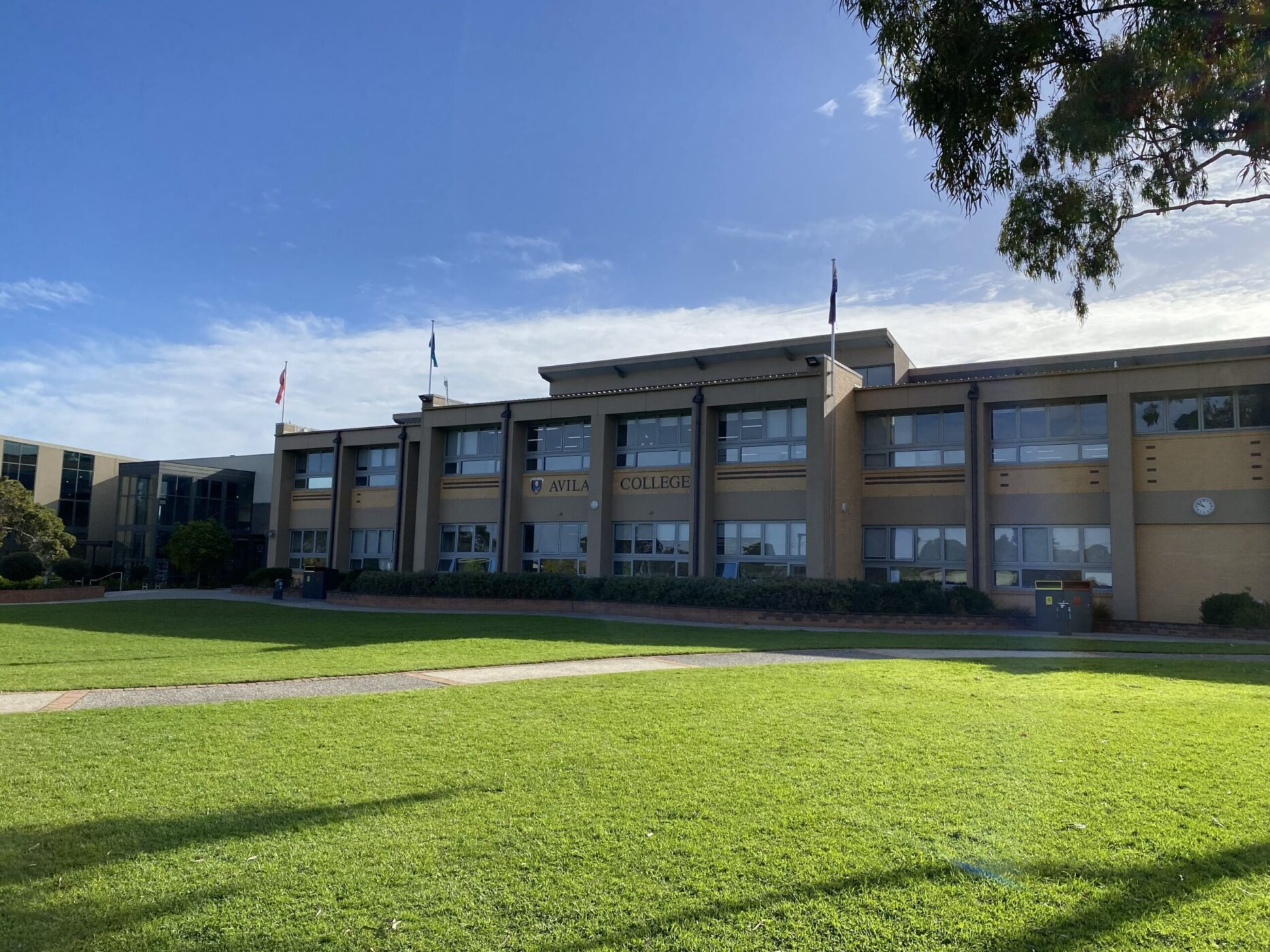
The school grounds are green and leafy and has an intimate feel about it despite housing around 1000 girls. Even though there isn’t a full sized oval on campus, the grounds and buildings are quite expansive and immaculately clean with well-manicured hedges. There seems to be some quite recent updates to the campus with a new Years 11 and 12 building and changes to the reception area.
There were many nods to First Nations culture in the naming of buildings and art on campus. Evidence that First Nations culture is taught and respected at the school.
We were taken around the school by two year 8 girls who were first timers taking tours. They were both quite confident and were able to lead us around and answer questions from parents. As they were only in year 8, they weren’t sure of some of how the programs for older students worked eg. Navigate for year 9s.
Students were seen quietly and calmly engaging in classes in traditional classroom settings with a teacher teaching at the front.
Enrolment at Avila College
As clearly stated on the website, “The first priority of Catholic schools is the provision of a Catholic education for Catholic children.”
Avila prioritises children from a list of Catholic primary schools.
I asked Dr Cotter about enrolling non-Catholic students and she seemed to think it was a good thing as it improved diversity and there are very few Catholic schools around that have purely Catholic students. She said that all students must respect the Catholic faith – eg prayers in the morning, standing up at particular times at church – but aside from that she seemed to welcome non-Catholic students.
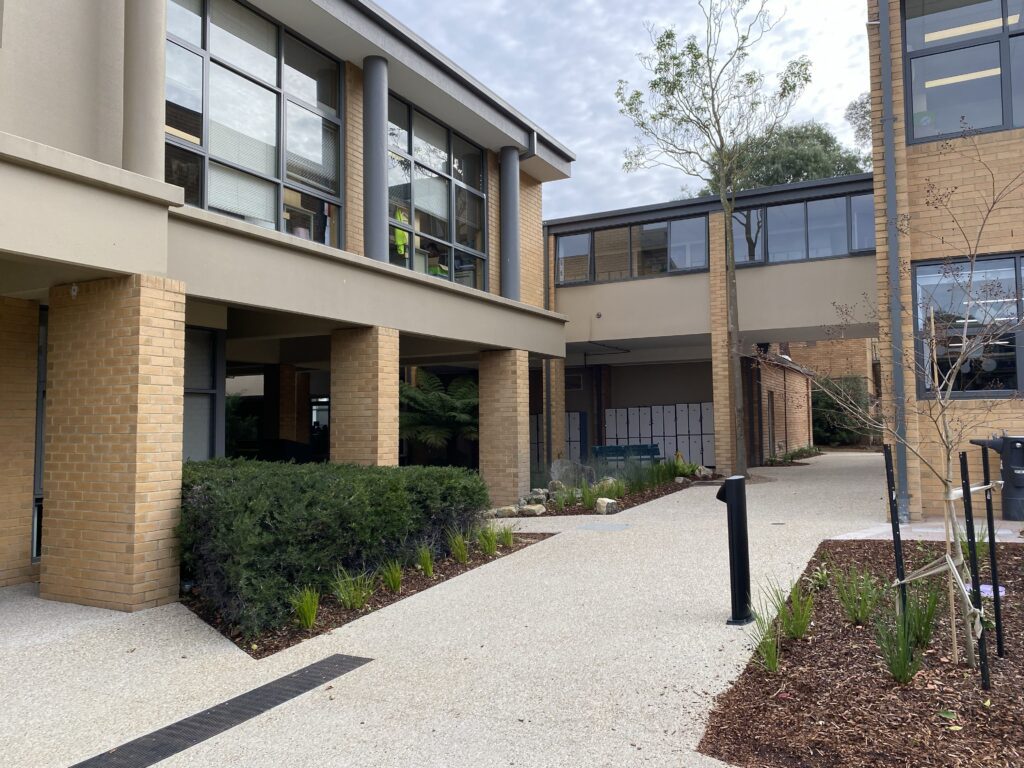

Year 7 at Avila College
Students mentioned the school is very supportive when they first start in year 7. Many of the students come from feeder Catholic primary schools but some come from other schools too.
Students spoke highly of year 7 camp and said they made very good friends there. Year 7 camp is two nights in Marysville, including one night spent camping in a tent. Dr Cotter enthused that the students are challenged in a safe way with canoeing, rock climbing as well as camping.
In year 7, Dr Cotter takes them for “Cookies and a Chat” in groups getting to know them.
Academics at Avila College
Academics wasn’t a big emphasis during the presentation or tour, although Dr Cotter did mention that most students take an academic pathway.
During the presentation, Dr Cotter mentioned acceleration of students usually happens within their cohort and within the curriculum. Some subjects are also easier to accelerate ( eg maths ) compared with others ( eg. English ). There are also learning supports to help students if they are struggling. Learning support staff include past students and also learning support officers.
Out of 150 staff, 102 are teachers. Dr Cotter said there is a big emphasis on professional development of the teachers and that they should all be always learning something.
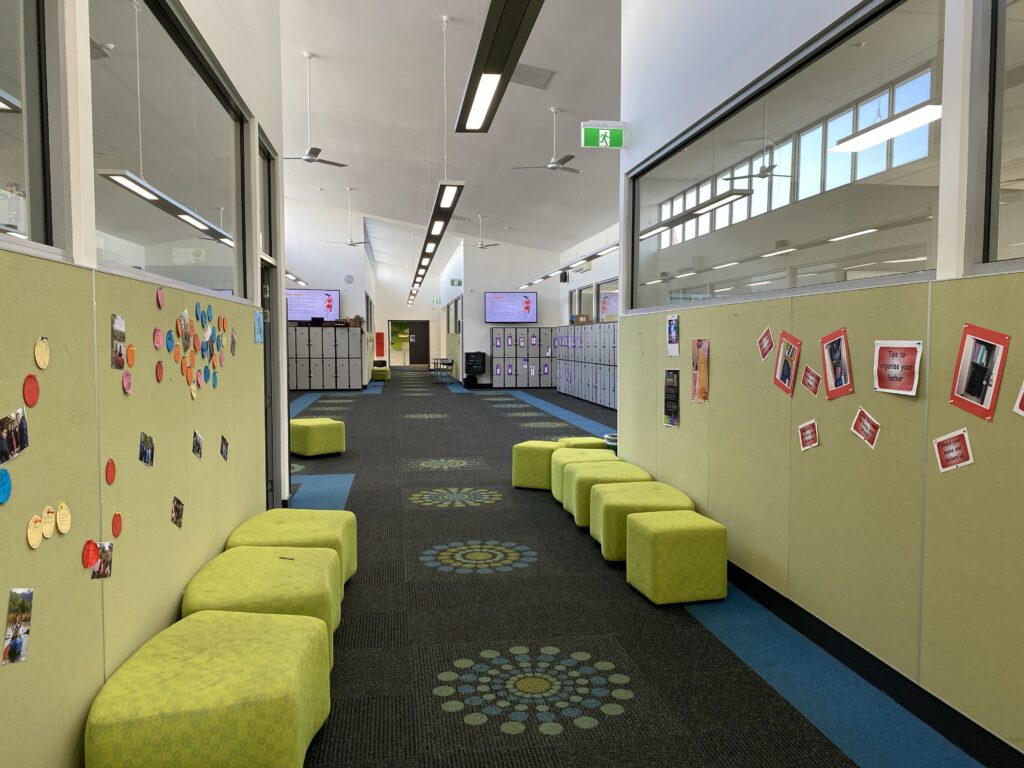

Science
We were taken to a science room where they kept some live animals including a bearded dragon and a turtle. Sciences mentioned on the tour include environmental sciences, agriculture and horticulture.
The science teacher mentioned that they are the only urban school to offer agriculture and horticulture. Next to the science room is a vegetable and native garden and also a chicken pen where apparently they plant wheat and other plants.
The girls said that there were other science rooms, however I don’t recall seeing them on the tour.
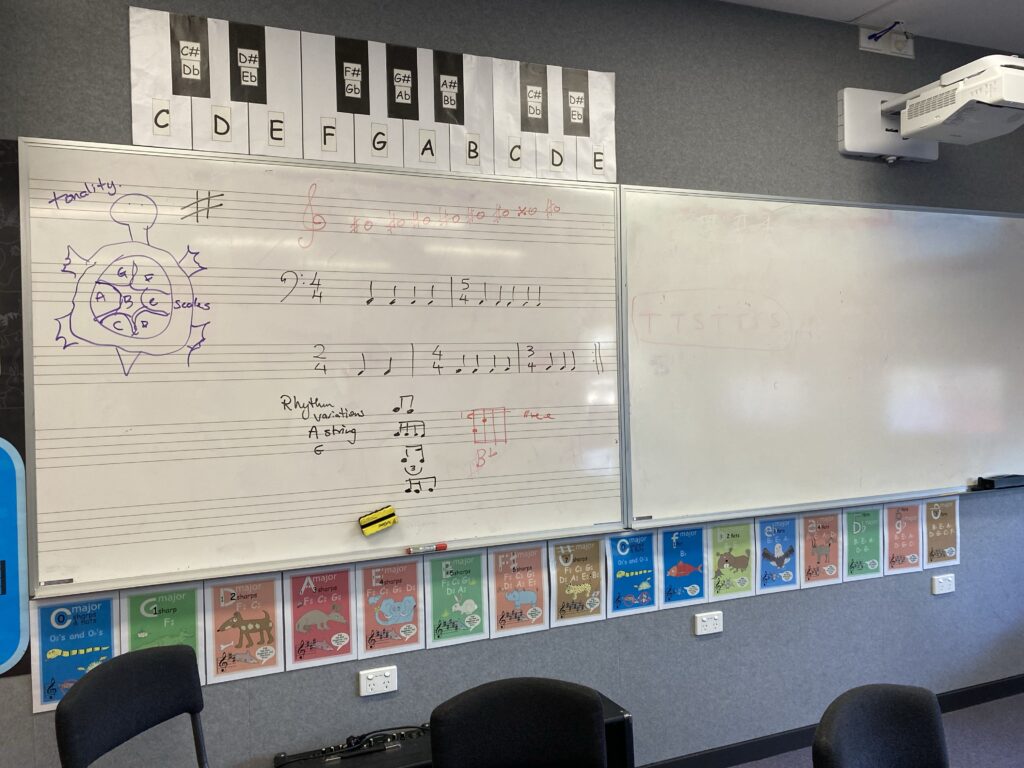

Music / Performing Arts at Avila College
Music is compulsory in younger years. Students are able to take instrumental classes in groups in classroom music. Students on the tour spoke of learning the double bass and being able to join in musical groups.
There is a student led “Creative Arts Spectacular” which I believe takes place every year. The entire production which involves orchestra, singing, dancing and backstage is entirely led by students.
In older grades performing arts is sometimes combined with other schools such as Mazenod. There is combined schools production that takes place with Mazenod, presumably annually.
Sport
We were taken through two large gymnasiums where a lot of the sports take place. Although there was a large open grassy area out the front of the school, it isn’t a full sized sports oval. 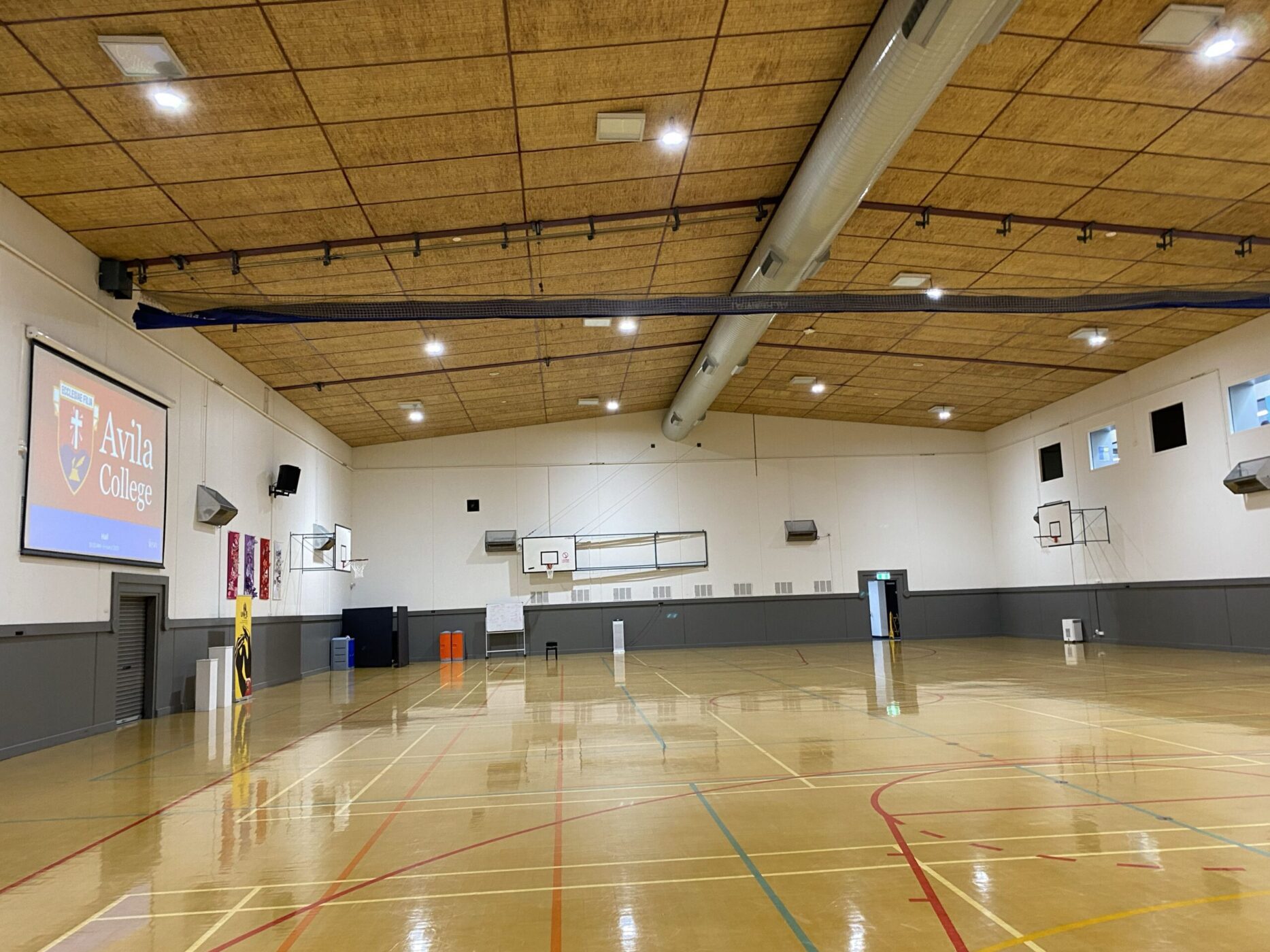

I believe there are many sports on offer and Avila is part of the CGSAV association – I assume this is a interschool sports association for Catholic Girls Schools. The sports teacher who was training the girls in a dance routine said that they train weekly and then compete with other schools.
Navigate Program
In year 9 students take part in the Navigate Program which seems like part physical challenge and part entrepreneurial program.
Students choose a challenge like surfing, rock climbing or escape room and carry out a business enterprise. For the business enterprise, they come up with an idea and pitch a product that Kmart would sell and real Kmart executives come and watch the pitch.
Clubs
Clubs seemed to be a highlight of school life at Avila. Students said that there were clubs for anything you can think of like crafts, sustainability, coding, robotics, books. They said if you had an idea of a club you can start one. The students that took the tour were both involved in several clubs and seemed to be really enthused about that part of their school life.
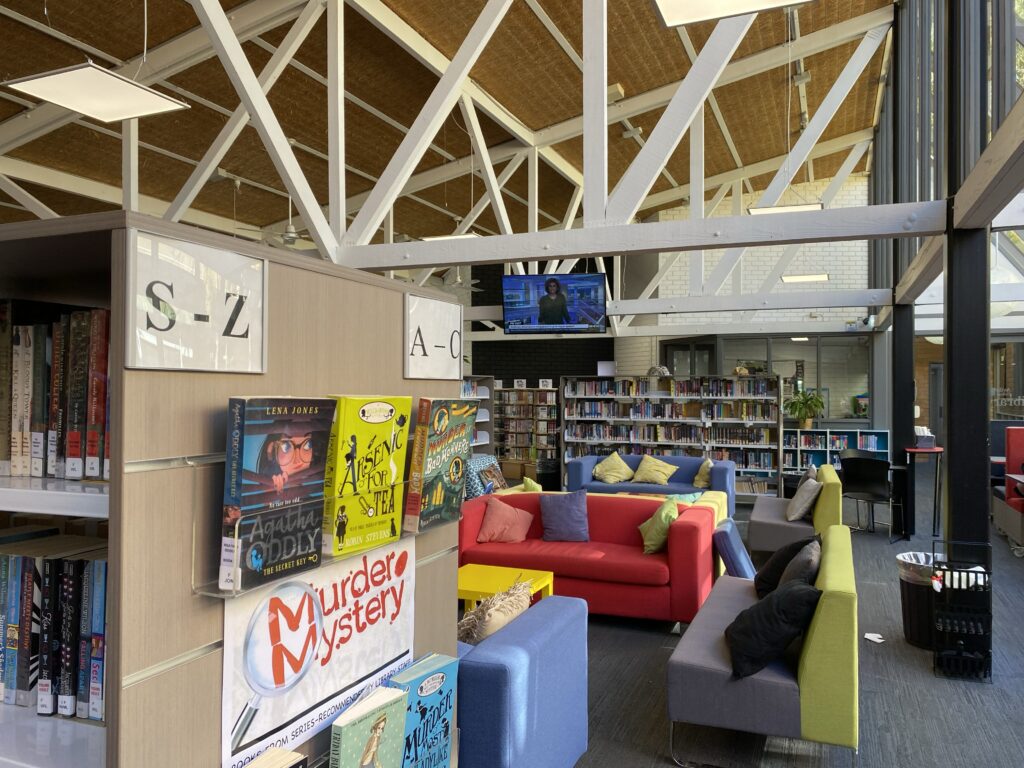

Inclusion and Wellbeing
I was lucky enough to have a few minutes of personal chat with Dr Cotter at the end of the tour. We spoke about diversity and neurodiversity. As neurodiversity is a broad description and needs can vary widely, she said that at Avila, they offer a very customised support depending on what the situation is. She gave the impression that whatever the support was required, it would be provided by the well resourced school and highly qualified staff.
We spoke about well being and how it is baked into the environment of the school. For example, the library where you’re allowed to talk and bring your lunch so students can have somewhere to go and hang out if they are feeling alone. Also some of the tables are sized small on purpose for intimate chats with a small group of people.
She also mentioned that well-being is the purpose behind some of the clubs that are available. For example, the craft club is intentionally a great place for students to chat to each other and staff while being busy with their hands.
Religion
Being a Catholic Girls School, religious education is part of the curriculum.
Students said they study the saints, learn about the traditions such as feast days. When they go to church it’s at Holy Family which is located close by.
I saw small symbols of faith around the school like a giant cross as you walk in and a small altar in one of the classrooms.
The vast majority of the girls are Catholic as children from Catholic feeder primary schools are prioritised, however according to the Principal, non-Catholics are also welcome.
Mobile phone policy
One of the student tour leaders said that they are not allowed to access their mobile phones for the entirety of the school day including lunch and recess. The phones remained in their lockers until after school. Apparently if you are seen with your phone you are warned. After 3 warnings comes a detention which seems like a community service type detention eg. canteen clean up
Socialisation with other schools
In the older grades, girls interact with students from boys schools such as Mazenod and Salesian. Dr Cotter spoke about the “Smash” program where the girls work together with the boys on performing arts and other projects as well as taking the Respectful Relationships program together.
The interaction aims to improve social and emotional skills of students.
Student Comments
Students seemed relaxed interacting with Dr Cotter.
They spoke highly of her and were visibly animated when I asked them what they thought of her. When asked, they really didn’t have anything negative to say about the school.
“She’s the best, and you can just ask her anything” ( of Dr Cotter )
“ I like the clubs the most. I’m a part of the Vex club which is a robotics club which I really enjoy”
“ A point of improvement, maybe have the Smash program in younger years too”
Final words
My impression is that Avila seems to be a reasonably progressive Catholic Girls School where girls are encouraged and challenged to try new things while they are in the safety of high school. Dr Cotter is particularly approachable and personable for a Principal and puts a high value of diversity of all kinds. Although girls are encouraged to do well academically, it seems that extra curriculars are very much a part of the culture with many and varied clubs available to join.
I was impressed that well-being isn’t just something that is taught, but seems to be thought about and baked in when creating the educational environment eg. the library, clubs.
Do you have any experience, questions or comments about this school? Let our community know and add a comment below. We’d love to hear from you!



